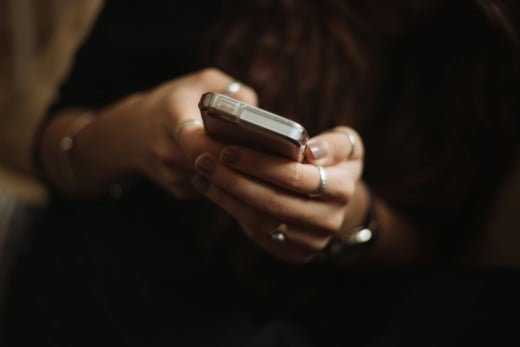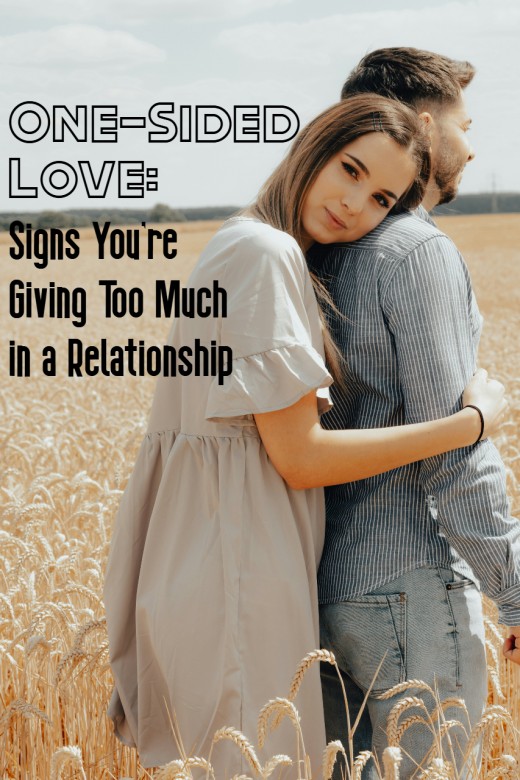Are You in a One-Sided Relationship? 8 Signs You’re Giving More Than You’re Getting

One-Sided Relationship Signs: How to Know When You’re the Only One Trying
When I first started dating my engineer husband, a well-meaning great-aunt pulled me aside with a kind of weary tenderness. “Never marry an engineer,” she cautioned. Her own husband was one, and she reflected that while he was steady, brilliant, and a great provider, she suffered an empty emotional life of feeling unnoticed, as if she was always reaching out across a quiet divide.
In her experience, engineers proved reliable in crises but absent in the everyday intimacy that makes love feel mutual. Her marriage sounded so emotionally dry and lonely. Thankfully, my experience has been different.
Still, I have never forgotten her words—because even if that stereotype did not hold true in my situation, the ache she described is painfully familiar for so many people (no matter their professional background). You plan the date nights. You initiate the conversations. You do the emotional heavy lifting. And for what?
Deep down, you feel the imbalance. Maybe you keep brushing it off. Your partner has been busy, tired, stressed. You tell yourself they’ll come around. However, the truth is hard to ignore: the relationship feels like it rests entirely on your shoulders.
One-sided relationships are emotionally exhausting and often destabilizing, especially when the imbalance lingers on. The lopsidedness in effort is not always obvious at first. In fact, it often creeps in subtly—until one day, you realize you're showing up far more than your partner is.
Here are some of the most common signs you may be stuck in a one-sided relationship and what these signs mean.

1. You Initiate Most of the Contact
You’re always the first to text, call, and check in. If you stopped reaching out, who knows how long the silence would stretch out? This can be one of the most gut-wrenching signs because it reveals effort isn’t being reciprocated at the most basic level.
Mutual communication is a core pillar of emotional connection. If the flow is only going one way, it often signals emotional detachment or avoidance on the other person’s part.1

2. You Make All the Plans
Whether it's date nights, weekend getaways, or even simple errands together, you’re the one organizing, scheduling, and following up. Your significant other simply shows up (if they show up at all).
This imbalance in planning responsibilities isn’t just about logistics. It reflects the distribution of emotional labor. When one partner is always in charge of holding the relationship together, resentment builds.2

3. Your Emotional Needs Go Unmet
You provide a sounding board for your significant other, listening to their rants and providing them comfort on hard days. However, when the roles are reversed and you're the one who is spiraling, your sweetheart changes the subject, goes quiet as they stare down into their phone, or they physically disappear altogether. Does this feel supportive?
You might try to rationalize their behavior as them being stressed, but consistently showing you that your needs come second isn’t just hurtful. This is a loud declaration that you're not a priority.3
4. Affection and Praise Are One-Sided
You're generous with your words, compliments, and affection. You remind them how much they mean to you and how proud you are of their efforts. In return you hear crickets.
When words of gratitude and recognition seem to flow only in one direction, it can slowly wear away at your self-worth. You begin to feel invisible, or worse, like loving them requires erasing yourself.

5. You're Always Making Excuses for Them
Other people start to notice how they treat you, and they make comments. As a result, you find yourself constantly defending your partner's behavior, not just to your friends and family but also to yourself. For example:
- “They’re just not good at expressing themselves.”
- “They’ve been through a lot in their life. Give them a chance.”
- "They're working on it."
- "They're going through a tough time right now."
- “You just don't like them.”
This pattern of excuse-making often signals cognitive dissonance: a deep knowing that something’s off, paired with a desperate hope that things will get better. But love shouldn’t feel like something you have to keep justifying.4

6. You Feel Anxious, Not Secure
Healthy relationships offer steady emotional safety, even when life gets tough. In one-sided relationships, however, that foundation cracks. When one person is doing all the emotional work, they’re often left stuck in a spiral of self-doubt, left to ask:
- Did I do something wrong?
- Does my partner even care?
- Should I be the one to fix this—again?
This kind of relational uncertainty isn't just exhausting; it’s psychologically harmful. Research shows that chronic relationship stress and emotional invalidation can contribute to symptoms of anxiety, low self-worth, and even clinical depression.5 Over time, being in a relationship where you constantly feel unsure of your value or role can erode your mental health in significant ways.

7. Boundaries Feel One-Sided, Too
You respect your partner's time, space, and preferences. Unfortunately, when you try to make a reasonable request or set a personal boundary—like needing more reassurance or requesting that they follow through on a promise—your partner acts offended, dismissive, or they guilt you.
In one-sided relationships, boundaries often flow in only one direction. The moment you assert yourself, you are dismissively labeled as “too much,” "high maintenance," or “difficult.”
8. You Keep Giving and They Keep Taking
This is perhaps the most painful hallmark. You're always the one accommodating, adjusting, and sacrificing. You overextend your energy, time, and patience in the hope that your partner will meet you halfway. They rarely do. When you finally ask for something in return, your lover acts inconvenienced—or worse, they withdraw.

The Psychology Behind One-Sided Relationships
These dynamics rarely happen in isolation. Research suggests that people who repeatedly end up in one-sided relationships often fall into two broad patterns: overgivers, who chronically prioritize others’ needs above their own, and undergivers, who consistently invest less emotional effort or reciprocity in their relationships. (Do you see yourself as either?)
Overgivers
Overgivers are typically driven by a deep need to feel needed, secure, or validated. They're often high in agreeableness and empathic concern, and many have anxious attachment styles or histories of childhood emotional neglect.6 They tend to equate love with effort—believing that if they just give more of themselves, they'll eventually receive the care they crave.
In relationships, such overgivers often ignore their own needs, hoping their sacrifice will win affection or approval. But overgiving is not generosity—it’s self-erasure masked as love.
Undergivers
On the flip side, undergivers often score high in avoidant attachment styles. They may feel discomfort with intimacy, resist emotional vulnerability, or fear dependency.7 Instead of putting in an equal level of emotional effort, they depend on their partner to do most of the work—initiating conversations, managing conflict, and keeping the relationship afloat. This imbalance isn't fair to the their other half, of course.
Undergivers aren’t always acting out of malice. In many cases, they are unaware of the imbalance. But even without bad intentions, they often end up taking more than they give—leaving one partner emotionally depleted and craving connection, while they remain distant or emotionally unavailable.
When one person is always doing the emotional work while the other pulls back, the relationship starts to break down. Without effort from both sides to make things more balanced, it often turns into a cycle of burnout, frustration, and alienation.8

Why It’s So Hard to Leave
One-sided relationships are like emotional quicksand—the more you hope, the deeper you sink. You hold on to the potential of what the relationship could be, not what it actually is. Overgivers often convince themselves that if they just love harder, try more, or stay patient, the coldness will thaw, the silence will break, and things will finally turn around.
But love isn’t something you earn by running yourself into the ground. It’s not a reward for exhaustion. You cannot force someone else to invest more emotional effort in the relationship.
At the same time, walking away is rarely easy, especially when your sense of self has become wrapped up in trying to make things work. It's a challenging situation because staying in a one-sided relationship often means slowly losing parts of yourself. And that’s a kind of loneliness that hurts even more, because you’re technically with someone, yet still feel painfully alone.

What Healthy Reciprocity Looks Like
Healthy relationships are built on mutual effort rather than silent resentment or scorekeeping. Both people reach out, make plans, offer support. When one is struggling, the other leans in.
It’s not about splitting everything 50/50 all the time. Life doesn’t work that way. Sometimes one partner carries more—but over time, the balance returns. When it doesn’t, it’s more than just unequal. It’s emotional deprivation.

Final Thoughts
One-sided relationships survive on silence, excuses, and you carrying more than your share. But the moment you call out what’s really going on, you start to take your power back.
If you’re always reaching, always fixing, always hoping—and all you get back is the bare minimum—then it’s time to face a hard truth: Is this the kind of love you truly want? Real love doesn’t leave you feeling anxious or unsure. It shows up fully, gives as much as it takes, and makes space for your feelings, not just your effort.
You don’t have to keep settling for less than you deserve. You deserve a relationship where care flows both ways and both partners are willing to give as much as they take.
References
1 Gottman Institute. (2023). The Four Horsemen: Criticism, Contempt, Defensiveness, and Stonewalling. https://www.gottman.com/blog/the-four-horsemen-recognizing-criticism-contempt-defensiveness-and-stonewalling/
2 Psych Central. (2022). The Toll of Emotional Labor in Relationships. https://psychcentral.com/health/emotional-labor-in-relationships
3 Perel, E. (2017). The state of affairs: Rethinking infidelity. Harper.
4 Psychology Today. (2021). Making Excuses for Bad Relationship Behavior. https://www.psychologytoday.com/us/blog/the-legacy-distorted-love/202109/stop-making-excuses-bad-relationship-behavior
5 Mental Health America. (2023). How Relationships Impact Mental Health. https://www.mhanational.org/healthy-relationships
6 Firestone, L. (2014). Why We Overgive in Relationships. Psychology Today. https://www.psychologytoday.com/us/blog/compassion-matters/201407/why-we-overgive-in-relationships
7 Levine, A., & Heller, R. (2010). Attached: The new science of adult attachment and how it can help you find—and keep—love. TarcherPerigee.
8 Morin, A. (2020). Why Overfunctioning and Underfunctioning Is a Toxic Cycle. Verywell Mind. https://www.verywellmind.com/the-toxic-cycle-of-overfunctioning-and-underfunctioning-5181064
© 2025 Elaina Baker








